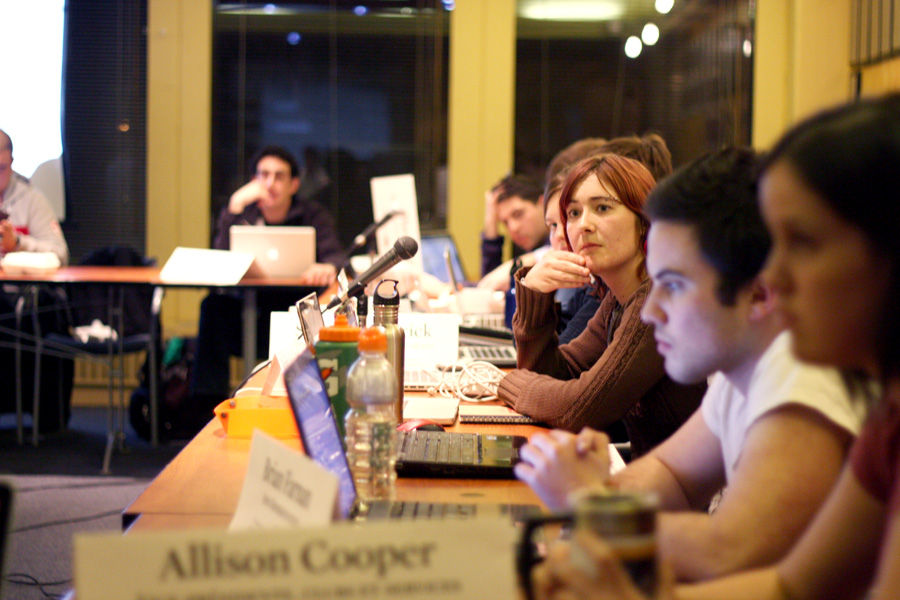Revision of Tuition and Student Fees
Certain charges to students’ fees are to be reviewed by the Students’ Society of McGill Unviersity (SSMU) and faculty members.
A motion presented at the SSMU Winter General Assembly (GA) on Feb. 27 called upon SSMU to “conduct a thorough review of all tuition and fees charged in all faculties or schools to which its members belong.” The motion was passed as a consultative forum—as the GA did not meet quorum—and was brought to Council for debate.
SSMU Political Campaigns Coordinator Christopher Bangs, who moved the motion at the GA, spoke to Council on Thursday evening, explaining that his recent experience with unclarified fees in one of his classes motivated him to bring forward the motion. Bangs clarified that he drafted and presented the motion as a regular McGill student, and not as the Political Campaigns Coordinator.
Science Representative David Chaim asked for clarification on who would enact the review, which led to an amendment of the motion. The following clause was added: “Be it resolved that the SSMU Vice-President (VP) University Affairs office undertake the aforementioned review on behalf of the student association SSMU.”
The motion originally passed with seven in favour, five opposed, and 12 abstentions, but it was later brought back to the table after Inter-Residence Council Representative Sarah Southey motioned to reconsider the document on the grounds that the high number of people abstaining indicated the need for further discussion.
Councillors went on to discuss the role of faculties in reviewing tuition and fees. Senate Caucus Representative Moe Nasr pointed out that since faculty associations have more direct ties with the course fees in question, they should be the actors involved in the review.
Other councillors supported a joint project between SSMU and the faculty associations.
“It has to be done by [faculties] … but it should be done as a joint project between SSMU and the faculty associations,” SSMU VP University Affairs Haley Dinel said.
SSMU VP Clubs and Services Allison Cooper proposed an amendment for SSMU to act in accordance with faculty associations, which was added to the motion. The motion passed with a vote of 21 in favour, zero opposed, and two abstentions. SSMU VP External Robin Reid-Fraser later commended the members of Council on actively resolving the motion’s unaddressed problems.
The Fate of SARC
Dinel presented a report on the Student Advisory Resource Committee (SARC) to councillors. SARC’s purpose is to help students navigate the McGill bureaucracy so that they can have their voices heard to a greater extent within SSMU and the administration.
SSMU Council allowed SARC a trial run over the 2012-2013 academic year to see if it would be an effective committee. The trial run ended on Mar. 15.
In her report, Dinel advised that SARC be kept as a committee, but that, in the interest of stabilization and institutionalization, it should be merged with the SSMU Policy Committee.
David Benrimoh, who is in his second year in the Faculty of Medicine, and Raphael Uribe Arango, U2 arts, are representatives of SARC. They gave a report on the Committee’s progress over the course of the academic year.
“SARC’s been bringing together students to make policies that affect all of us, that benefit all students, that also help individual students have a voice and have an impact on campus, which a lot of students didn’t feel they could because they didn’t know how to go about writing proposals, or working with SSMU,” Benrimoh said.
Following the presentations, Council adopted Dinel’s report.
Funds’ and Services’ Fees Up for Renewal
Councillors also approved three questions that will be voted upon during the special SSMU referendum period, which lasts from
Apr. 5 to Apr. 13. The Charity Fee of $0.50, the Sustainability Projects Fund fee of $0.50, and the SSMU Environment Fee of $1.25 are all up for renewal from the period of Fall 2013 to Winter 2018.
Conflict Minerals Screened as Negative Investment
Council discussed a motion that called for SSMU’s Financial Ethics Research Committee (FERC) to be “mandated to include conflict minerals as a ‘Negative Screen,’” which would then allow for SSMU to consider conflict mineral-free investments. FERC is a committee that aims to establish sustainable and ethical policies and practices for SSMU.
The motion passed with 22 in favour, zero opposed, and two abstentions.








